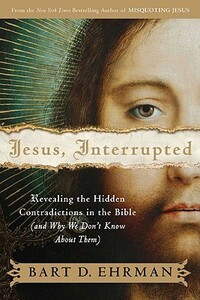Take a photo of a barcode or cover
144 reviews for:
Jesus, Interrupted: Revealing the Hidden Contradictions in the Bible & Why We Don't Know About Them
Bart D. Ehrman
144 reviews for:
Jesus, Interrupted: Revealing the Hidden Contradictions in the Bible & Why We Don't Know About Them
Bart D. Ehrman
informative
reflective
fast-paced
http://www.somestrangeideas.com/2009/06/03/jesus-interrupted/
informative
reflective
medium-paced
This is the kind of book that would have made me very angry a few years ago. Either I am getting more liberal, for lack of a better term, in my old age or I am just learning to be more friendly and gracious with those I disagree with.
Ehrman bends over backwards in this book to affirm that you can know all of the information he presents and still be a Christian, albeit perhaps not a fundamentalist one. He recognizes that many of his friends and colleagues, other scholars with just as many degrees as he, remain in the faith. Maybe it is that recognition that helped me enjoy this book more, as opposed to a book that might use the same sort of scholarship to viciously attack the faith.
I think this book is a good introduction to historical-critical scholarship. Ehrman shows differences between the gospels, explains why there is skepticism over whether Paul wrote all the letters attributed to him, and sheds light on other early Christian works that are not in the Bible. For all of that, this book is a helpful read.
As always, there are points in the book that are frustrating. When Ehrman talks about how "serious" scholars agree on this or that it makes me think he just draws a circle around those who agree and labels them as "serious." Just what is a "serious" scholar anyway? When he goes through a brief outline of the rise of Christianity (chapter seven) he portrays Paul as a sort of initiator of anti-Jewish teachings, practically ignoring the fact that Paul was Jewish himself. Along the same lines, he argues that it is not until the Gospel of John that we find Jesus unequivocally considered God, as the earlier gospels portray a much more human Jesus. But how does a passage like Philippians 2:5-11 fit into that,a text in which Jesus is portrayed in very God-like terms that comes from much earlier than even the earliest gospel.
Perhaps I could nitpick other things, but then I might not be friendly...and I am certainly not a serious scholar! Upon finishing this book I picked up (well, downloaded) NT Wright's How God Became King. It is interesting to see the contrast between these two scholars (I wonder if Ehrman considers Wright "serious" enough; I wonder if Wright was thinking of Ehrman when he took a shot at people who only consider certain like-minded scholars serious?). I'd love to see Wright and Ehrman come into dialogue. What has become clear is that they each focus on different aspects of the Gospels. While Ehrman talks a lot about differences in the gospels and doubts the traditional names of the authors, he never really gets into the message of the gospels as a whole. Wright, on the other hand, is not interested in form criticism, he is more interested in hearing the message of the gospel stories as we have them. I am sure there are philosophical differences, as Ehrman comes from a position of skepticism while Wright comes from a position of faith.
All that to say, please read both. It is easy for skeptics or more "liberal" Christians to only read Ehrman just as it is easy for believers or "conservative" Christians to only read Wright. As Ehrman says, the information he interprets does not necessarily lead to leaving the faith. Ehrman, Wright and many others are good authors and we Christians would do ourselves well to read all of them, especially those we tend to disagree with.
Ehrman bends over backwards in this book to affirm that you can know all of the information he presents and still be a Christian, albeit perhaps not a fundamentalist one. He recognizes that many of his friends and colleagues, other scholars with just as many degrees as he, remain in the faith. Maybe it is that recognition that helped me enjoy this book more, as opposed to a book that might use the same sort of scholarship to viciously attack the faith.
I think this book is a good introduction to historical-critical scholarship. Ehrman shows differences between the gospels, explains why there is skepticism over whether Paul wrote all the letters attributed to him, and sheds light on other early Christian works that are not in the Bible. For all of that, this book is a helpful read.
As always, there are points in the book that are frustrating. When Ehrman talks about how "serious" scholars agree on this or that it makes me think he just draws a circle around those who agree and labels them as "serious." Just what is a "serious" scholar anyway? When he goes through a brief outline of the rise of Christianity (chapter seven) he portrays Paul as a sort of initiator of anti-Jewish teachings, practically ignoring the fact that Paul was Jewish himself. Along the same lines, he argues that it is not until the Gospel of John that we find Jesus unequivocally considered God, as the earlier gospels portray a much more human Jesus. But how does a passage like Philippians 2:5-11 fit into that,a text in which Jesus is portrayed in very God-like terms that comes from much earlier than even the earliest gospel.
Perhaps I could nitpick other things, but then I might not be friendly...and I am certainly not a serious scholar! Upon finishing this book I picked up (well, downloaded) NT Wright's How God Became King. It is interesting to see the contrast between these two scholars (I wonder if Ehrman considers Wright "serious" enough; I wonder if Wright was thinking of Ehrman when he took a shot at people who only consider certain like-minded scholars serious?). I'd love to see Wright and Ehrman come into dialogue. What has become clear is that they each focus on different aspects of the Gospels. While Ehrman talks a lot about differences in the gospels and doubts the traditional names of the authors, he never really gets into the message of the gospels as a whole. Wright, on the other hand, is not interested in form criticism, he is more interested in hearing the message of the gospel stories as we have them. I am sure there are philosophical differences, as Ehrman comes from a position of skepticism while Wright comes from a position of faith.
All that to say, please read both. It is easy for skeptics or more "liberal" Christians to only read Ehrman just as it is easy for believers or "conservative" Christians to only read Wright. As Ehrman says, the information he interprets does not necessarily lead to leaving the faith. Ehrman, Wright and many others are good authors and we Christians would do ourselves well to read all of them, especially those we tend to disagree with.
informative
reflective
medium-paced
informative
slow-paced
This book didn't have any super new information for me *arrogant hair toss* but this is definitely a decent read. The author's highlighting of the contradictions is to a purpose. He wants to reframe how people approach the bible, rather than criticize religious followers for having faith. Ehrman does not berate the reader, nor does he ridicule anyone for trying to syncretize (sometimes wildly) differing accounts of Jesus's life. This book primarily exists to contextualize the New Testament in the culture and history of the time in which it was written. Sometimes I wish the author had chosen one track- contradictions, early church history, forgeries- and stuck with it because all topics are pretty fascinating. I wanted to hear about them all in depth! However, it seems as though you can't really isolate one from the other. And as an intro this book strikes me as very helpful.
informative
medium-paced
I wish this didn't have such a scary-sounding subtitle, because I think a fair number of potential evangelical readers will write the book off as part of some deceptive agenda to turn people away from Christianity.
In fact, this book does nothing of the sort. Many scholars, theologians, and regular Christians are perfectly fine with the information in this book, and do not turn away from Christianity because of it.
This is not an anti-Christian book, or an anti-Bible book. It presents problems for certain sects of Christianity (such as modern evangelicalism), but not for Christianity itself.
I say it's a shame, that less evangelicals will read this, because I think the information here is not only interesting, but deeply important.
More people should be familiar with the "historical critical method" of reading the Bible, how the Bible was written and put together, the serious contradictions it contains, and what that all can mean for us today—both for the faithful, and for the non-religious who want to better understand the most highly influential book in Western culture.
JESUS, INTERRUPTED is well-done, respectful, and relevant. My only complaint might be that it was too short. I find myself wanting to learn more.
In fact, this book does nothing of the sort. Many scholars, theologians, and regular Christians are perfectly fine with the information in this book, and do not turn away from Christianity because of it.
This is not an anti-Christian book, or an anti-Bible book. It presents problems for certain sects of Christianity (such as modern evangelicalism), but not for Christianity itself.
I say it's a shame, that less evangelicals will read this, because I think the information here is not only interesting, but deeply important.
More people should be familiar with the "historical critical method" of reading the Bible, how the Bible was written and put together, the serious contradictions it contains, and what that all can mean for us today—both for the faithful, and for the non-religious who want to better understand the most highly influential book in Western culture.
JESUS, INTERRUPTED is well-done, respectful, and relevant. My only complaint might be that it was too short. I find myself wanting to learn more.




